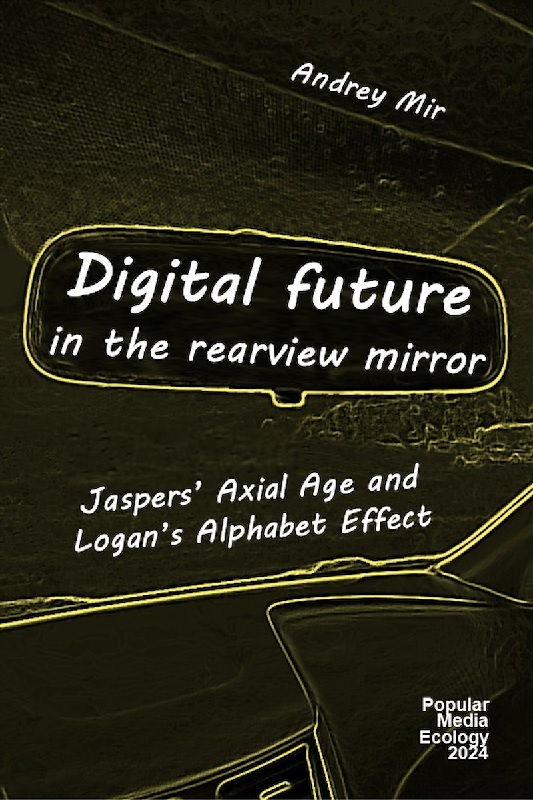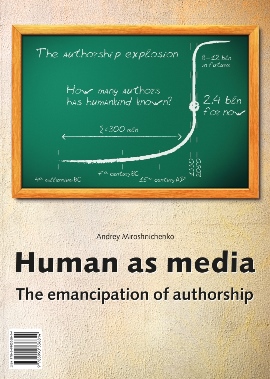The social trauma of the alphabet involved the dissolution of society based on tribal unity and kinship. Now, digital orality reverses the media effects of the alphabet and retrieves some features of tribal orality.
One of the disservices brought by any new medium is the disruption of the services provided by the old medium. Literacy not only offered new affordances but also discontinued the affordances of orality. By isolating the sense of vision and remodeling vision into a cognitive faculty, literacy disturbed the natural equilibrium of the senses.
In general, orality provided the environmental coherence of mind that kept humans within the environmental assemblage, while alphabetic literacy forced inquiring minds to disassemble reality. The result was the withdrawal of humans from the natural environment and the demise of environmental thinking. According to McLuhan, the alphabet extracted humans from “the tribal trance of resonating word magic and the web of kinship.”[1]
The sensory-cognitive and social effects of the alphabet can also be seen as cognitive and social trauma. Cognitive trauma was a downside of the rejection of analog thinking and magic. The revelation that things were not necessarily related to other things but could also be a physical embodiment of their own ideas shattered the habitual world into incongruent pieces in which an individual, also a shattered piece of the former tribal unity, can easily be lost. Marshall McLuhan often highlighted this when he spoke about the alphabet, such as in the passage: “It follows, of course, that literate man, when we meet him in the Greek world, is a split man, a schizophrenic, as all literate men have been since the invention of the phonetic alphabet.”[2] McLuhan then quotes Bertrand Russell:
Not all of the Greeks, but a large proportion of them, were passionate, unhappy, at war with themselves, driven along one road by the intellect and along another by the passions, with the imagination to conceive heaven and the wilful self-assertion that creates hell.[3]
The social trauma of the alphabet involved the dissolution of society based on tribal unity and kinship. This, again, can be seen as a two-sided process involving both gains and losses. Social regulation based on kinship, honour, and sacred knowledge was replaced with regulation based on codified law, economy-based stratification, and individual moral duties. In a literate society, well-being and social security became available to a larger number of people; this was one of the alphabet’s affordances. But the gap in technological advancement between cultures, boosted by the alphabet, also amplified the scale of colonialist conquests and wars.
Touching upon the disservices that the alphabet brought specifically to the Greeks, Robert Logan states that the specialization and fragmentation induced by the alphabet eventually turned into tunnel vision. The separation of concept from percept ended up in abstract rationality that was often divorced not just from the environment but also from common sense. Starting with Parmenides, Greek thinkers were forced to “choose between trusting their senses and trusting logic.”[4] They chose logic. As Logan puts it,
The abstractness of the phonetic alphabet promoted a divorce of brain and hand, a disdain of empiricism, and excessive adherence to logical rigor among Greek thinkers, each of which inhibited the development of modern science.[5]
The Greeks developed philosophy and theoretical thinking to heights that remained unparalleled through millennia until the modern day. But it came at the cost of neglecting empiric knowledge.
Logan specifically highlights that abstract logic, fostered in the Greeks by the alphabet, also prevented them from discovering zero, a fundamental concept for theoretical and practical knowledge based on calculations. As Logan explains it,
Although Greek science contained many of the elements of modern abstract science, it took 2,000 years for a fully mathematical description of nature à la Newton to develop. Because two major factors were missing from Greek science, full flowering was held back until the European Renaissance. One factor was the lack of an experimental orientation, and the other was the absence of the concept of zero. Paradoxically, the same rational, logical way of thinking that contributed to the early development of abstract science also inhibited both these factors.
The importance of zero to science is twofold. First, it led directly to a place number system (Arabic numerals) and, as a consequence, to simpler arithmetical calculations. Second, zero also encouraged the development of algebra. The Greeks precluded the possibility of inventing zero when they accepted Parmenides’ arguments for the impossibility of non-being.[6]
This disdain for empiricism is evident in Plato’s Allegory of the Cave. The world of sensory perception, according to Plato, represents the lowest realm inhabited by the cave prisoners who can only observe shadows on the wall. The prisoners of the empirical world assign names to the shadows but are unable to see the true world of ideal forms that cast those shadows into the darkness of the cave. These ideal forms can only be comprehended through reason, not through sensory experience.
With such an ethos of abstract logic, the Greeks’ brightest minds deprived themselves of any interest in technological applications. This is not to say the Greeks, Romans, and those after them did not make any technological advancements. They did, and those advancements inevitably exceeded the technologies of non-literate cultures. But the primary focus of alphabetized Greece was on the rational, not empirical, cognizing of life, the universe, and everything.
It was not until the early modern period when technological inventions and scientific discoveries from the Chinese, Indians, and the Islamic world, including printing, paper, gunpowder, the compass, and others, along with the advancements in algebra, medicine, and alchemy, began to reach Europe. These contributions merged with the rigorous logic of Greek reasoning, European technologies, and the media effects of the printing press. All together, this enabled the European breakthrough in both abstract science and applied technologies – the Technological Revolution.
The environmental withdrawal – the separation from Nature – is commonly perceived as a loss of harmony. After Rousseau, who used the stock character of the “noble savage” to expose the hypocrisy and corruption of fellow Europeans, this natural harmony has often been viewed in a romantic light as an ideal for human relations with Nature and each other. However, the natural harmony of the senses that humans possessed as a biological species did not automatically provide a harmonious or comfortable life in natural settings. Very few locations on Earth can offer a more or less safe life for humans in the wilderness without a 24/7 fight for survival. After all, the Promethean gift of technology was bestowed upon humans precisely because of the harshness of Nature – to ensure their survival.
The same holds true for the loss of social harmony: harmony as an ecological equilibrium is often confused with harmony as a desired quality of life. Social “harmony” in orality excluded any identity other than totemic or tribal identity with which everyone had to comply. The harmony of “empathic involvement”[7] also meant the total absence of personal space and constant requests for status affirmation resulted in both (and often simultaneously) caring and bullying; or, else, caring that obliges. For example, within such “empathic involvement,” compulsory hospitality cannot be refused under the threat of hospitality turning into hostility. Such social “harmony” works well as a collective survival strategy, but it is not that sort of harmony that aims to please or give some sort of environmental or moral “closure”.
Nevertheless, even though the environmental and social harmony of orality might often be misunderstood, the cognitive, social, and environmental balance of the preliterate mind and preliterate society was certainly disturbed by the alphabet, as always happens when a new medium takes over. The environmental withdrawal, amplified by technologies, has eventually led to catastrophic consequences, such as environmental pollution. However, it also must be noted that ecological awareness and ecological initiatives themselves are distant effects of the alphabet and a logical response to the same environmental withdrawal that led to ecological distress in the first place. Eco-movement logically emerged as a byproduct of alphabetic literacy, with its aptitude for analysis and self-reflection.
The environmental withdrawal, however, was not the only disservice of the alphabet. The alphabet also fostered a new sort of intolerance in humans – ideological intolerance.
This is not to say that hostility had not been known in preliterate cultures. Ancient narratives are full of stories of murder and genocide, along with slavery, infanticide, torture, misogyny, and other terrible things. If we compare the “culture” of violence in orality and literacy, we will find that environmental detachment made “literate violence” more technological and less physiological; it is more focused on “efficiency” and less on the physiology of pain. Conversely, orality, with its agonistic mentality, status competition, and bragging, favoured the personal and “bodily” attitude toward harm and murder. Tribal collective involvement required collaborative-competitive personal devotion in everything, including bullying, animosity, and victimization. In oral violence, causing pain was not a “side-effect” of some other solutions – it was the sought solution. The inventiveness in tortures, rape, and killing was normalized into ritualistic communication of such stark ingenuity that would be seen as sadistic in a literate culture.
What was new after the introduction of the abstract absolute by the alphabet was a rationally elaborated ideological provision for violence. It was not without reason that Postman called Plato not only the “most luminous intellect” of antiquity but also “the world’s first systematic fascist.”[8]
The alphabet contributed to ideological intolerance through the invention of monotheism and universal principles. The very idea of the absolute is exclusive and exceptionalist. If in orality, hostility and murders were a matter of otherness or rage, alphabetic literacy added ideological intolerance to the list of “motivations” for violence.
On the other hand, the emergence of codified law instead of regulation by honour and blood kinship introduced efficient measures of controlling violence by forming a monopoly on violence and assigning it to special institutions ruled (ideally) by law. Overall, while one side-effect of the alphabet was the introduction of a new “reason” for violence, other effects eventually led to restraining violence through new regulations.
The environmental withdrawal of humans by the alphabet was reversed by electronic media – electronic media retrieved a simultaneous and spherical perception of reality. McLuhan uses the metaphor of Sputnik to show that the entire planet, as a physical space, became the space of a new electronic enclosure. As he puts it,
Perhaps the largest conceivable revolution in information occurred on October 17, 1957, when Sputnik created a new environment for the planet. For the first time the natural world was completely enclosed in a man-made container. At the moment that the earth went inside this new artifact, Nature ended and Ecology was born. “Ecological” thinking became inevitable as soon as the planet moved up into the status of a work of art.[9]
Observing the turn of Nature to Ecology by means of human technologies, McLuhan comes up with a beautiful quote:
On Spaceship Earth there are no passengers; everybody is a member of the crew.[10]
Because of electronic media, we became the crew of Spaceship Earth in the same way as preliterate humans were the crew of the tribe enclosed in the situational environment and the listeners of the Iliad were the crew of Homer. All of them, and now us, have their part in this theatre, now the Global Theatre; the late McLuhan switched from the Global Village to the Global Theatre to underscore not just total connectivity but also “empathic involvement” and the practical engagement of everyone in the global performance. “We all are the crew on Spaceship Earth” is not so much a call for ecological action, as some think (moral calls were atypical for McLuhan), but rather an assertion of the fact that we are now enclosed in the new global environment.
The difference is that it is no longer the natural environment given to us by virtue of our biological origin. It is the technological environment, an environment induced by our alphabetic activity (as both coding and electronic media were created by the alphabetic mind).
A chapter from Digital Future in the Rearview Mirror: Jaspers’ Axial Age and Logan’s Alphabet Effect.
See also books by Andrey Mir:
- Digital Future in the Rearview Mirror: Jaspers’ Axial Age and Logan’s Alphabet Effect (2024)
- Postjournalism and the death of newspapers. The media after Trump: manufacturing anger and polarization (2020)
- Human as media. The emancipation of authorship (2014)



[1] McLuhan, Marshall. (1994 [1964]). Understanding Media, p. 82.
[2] McLuhan, Marshall. (1962). The Guttenberg Galaxy, p. 22.
[3] McLuhan, Marshall. (1962). The Guttenberg Galaxy, p. 22. The quote used by McLuhan is from: Russell, Bertrand. (1967 [1945]). History of Western Philosophy, p. 39.
[4] Logan, Robert. (2004 [1986]). The Alphabet Effect, p. 118.
[5] Logan, Robert. (2004 [1986]). The Alphabet Effect, p. 166.
[6] Logan, Robert. (2004 [1986]). The Alphabet Effect, pp. 117-118.
[7] McLuhan, Marshall. (1962). The Guttenberg Galaxy, p. 39.
[8] Postman, Neil. (2000 [1999]). Building a Bridge to the 18th Century, p. 13.
[9] McLuhan, Marshall. (1974). “At the moment of Sputnik the planet became a global theater…,” p. 48.
[10] McLuhan, Marshall. (1974). “At the moment of Sputnik the planet became a global theater…,” p. 50.
Categories: Digital Future in the Rearview Mirror, Immersive experience, Marshall McLuhan, Media ecology


Leave a comment